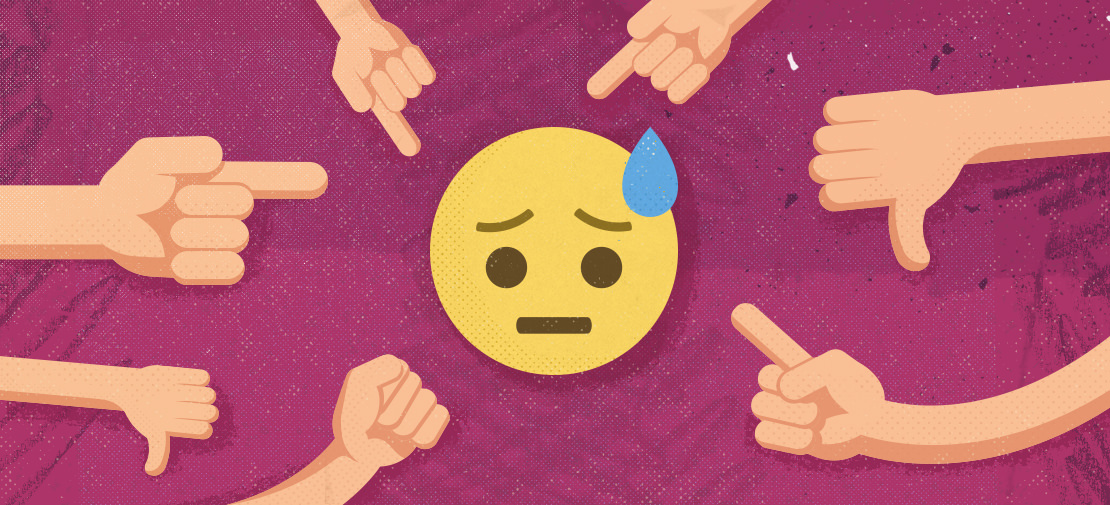

Bullying

Everyone has the right to be treated with respect and to feel safe.
Bullying is never:
- cool – it’s not 'just having a laugh' and it’s not funny.
- just a normal part of growing up.
- an okay thing to do.
- deserved.
What can I do to make things better?
There are people who can help you if you’re being bullied. Ask for help. Don't keep it a secret. Bullying is too hard to cope with on your own.
It can be hard to speak up, but talking to someone can help you:
- Feel less alone and more in control of the situation.
- Get support.
- Get a clearer picture of what’s going on.
- Start making changes for the better.
How can I ask for help?
- Find someone you trust and who will listen.
- Let the person know it’s important, and ask them to talk to you privately.
- Tell them what has been happening and how it is affecting you.
- Ask them for advice.
- Tell them how you’d like them to help you.
Here are some other ideas that may help:
1. Walk away
It may be safest to just walk
away, especially if the bullying could become violent. Walk tall,
and head to a place where you’ll feel safe with other people.
2. Stay calm and be strong
If you feel
safe, stay calm and be strong. Even if you’re not feeling confident,
it helps to act as if you are.
- Stand tall and hold your head up high.
- Make eye contact.
- Use a calm but firm voice.
- Practice what you might say to the person bullying you.
-
You might like to try this with someone you trust or with a
counsellor from 0800 What’s Up.
3. Distance yourself
Stay away from the
places they hang out, and ignore them if you see them around.
4. Don’t let them bring you down
Keep
doing things you enjoy, and get involved in creative things that
take your mind off what’s going on.
- Listen to music.
- Read your favourite books and blogs.
- Watch funny or inspiring videos and movies.
- Hang out with friends or whānau.
- Stay active and spend time outdoors.
5. Talk to a teacher or a counsellor about what they can
do
There are many different kinds of bullying:
Physical bullying is when someone
- Pushes you around.
- Beats you up and hurts you.
- Steals your stuff.
- Damages something of yours.
Verbal bullying is when someone
- Calls you names.
- Talks aggressively, by shouting or yelling at you.
- Threatens you.
Social bullying is when someone
- Excludes or ignores you.
- Embarrasses you or spreads rumours about you.
- Backstabs or disses you behind your back.
- Pressures you to do something you don’t want to do.
Also see our
Cyber Bullying page.
Why am I being bullied?
Bullying can happen to anyone. You’re not alone.
Bullies will target people they think will be easy to take advantage of. This is because bullies feel like they have all the power, and that no one will stand up to them.
Bullies may target:
- People who are quiet, softly spoken, not very confident, or shy.
People who react quickly and lose their cool. They can upset the other person on purpose to get them in trouble.
- People who are different from themselves. Some of these differences may be cultural beliefs and language barriers; different taste in clothing or music, or having an own style; doing well at school; sexual orientation; having a disability; or body shape, size or maturity.
The truth is that every one of us is a unique individual, and
this is something that should be celebrated!
It’s never okay for someone to bully you for being you – no matter what. Be proud of your differences. You have the right to be who you are.
Bullies often pick on people because they feel unhappy or frustrated, and want to take it out on someone else. Or because they feel insecure, and are trying to show off or impress others.
Whatever the reason, bullying is never okay. You have the right to speak up and get support.
It’s not me, it’s someone else being bullied
– what can I do?
Don’t just stand there and watch
- Speak out and let the bully know what they’re doing is not funny.
- Keep yourself and others safe. Find an adult if you feel someone may be in danger.
- Be nice to the person who is being bullied. People who are being bullied can feel very lonely. You can make a big difference to how they feel.
- Tell a teacher or an adult about what’s happening.
I’ve bullied people before and I want to change – what can I
do?
By reading this you’ve taken the first step, and that’s a really brave and positive thing to do. Here are some pointers to help you change your behaviour:
- Put yourself in the shoes of someone who’s been bullied.
- Take responsibility. Own up to what you did. Accept the consequences of your behaviour.
- Apologise to the person you bullied.
- Stop hanging around with people who bully others.
- Talk to your family or school counsellors about what’s happened and how you’re feeling. Ask them to help you.
- Learn how to respect others and to manage conflict – you may need to learn some new ways of communicating. Our 0800 What’s Up counsellors can help you with this. We’re here to support you.

Charities Commission number: CC21844 - Registration details on the Charities Commission Website


